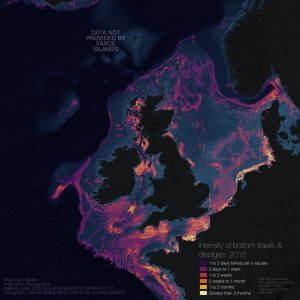“Reducing bottom-trawling efforts by 26% could result in protecting 70% of Europe’s Atlantic sea area with small impact on the fishing sector, while delivering huge benefits to the marine environment.”
.
Fishing has been an important part of life in Sidmouth:
Film – Sidmouth Coastal Community Hub CIC
A living fishing tradition in Sidmouth – Vision Group for Sidmouth
Today, much of the fishing industry is facing uncertainty:
An uncertain future for Devon’s fishing industry – Vision Group for Sidmouth
Dismay from South West fishing communities – Vision Group for Sidmouth
Much of that dismay is about over-fishing in UK waters:
Marine conservation after Brexit – Vision Group for Sidmouth
One very destructive practice being ‘pulse fishing’:
Marine conservation after Brexit: part two – Vision Group for Sidmouth
There is a lot of pressure on the UK government to protect fishing stocks:
Ensuring the sustainability of UK fish populations – Vision Group for Sidmouth
And one way is to create specially protected areas:
Lyme Bay’s Marine Protected Area – Vision Group for Sidmouth
.
A fortnight ago, the Environment Secretary promised “increased protections for England’s waters through pilots of Highly Protected Marine Areas”. However, the Parliamentary committee is not impressed:
The government’s policy and targets are toothless and inadequate to address the UK’s biodiversity loss, the Environmental Audit Committee (EAC) warns… They also note policymakers should set out management plans and effective monitoring for all Marine Protected Areas (MPAs), with destructive bottom trawling banned or restricted.
Government criticised over ‘toothless’ biodiversity strategy – Energy Live News
The EAC report does indeed focus on one particularly destructive practice:
For seas, destructive bottom trawling should be restricted or banned in all marine protected areas and more “no-take” zones must be established.
Tories’ ‘toothless’ UK policies failing to halt drastic loss of wildlife | Wildlife | The Guardian
.
Looking at the wider perspective, it’s a concern many have across Europe:

Closing up to 70% of Europe’s seas to bottom trawling: Little loss to fishing sector but huge environmental gains
Advice by the International Council for the Exploration of the Sea (ICES) released today (24 June) shows that reducing bottom-trawling efforts by 26% could result in protecting 70% of Europe’s Atlantic sea area with small impact on the fishing sector, while delivering huge benefits to the marine environment. These include restoring biodiversity and mitigating climate change.
Oceana in Europe Campaign Director for Marine Protection Nicolas Fournier said: “Today’s advice brings new scientific evidence that closing off vast parts of Europe’s seas to bottom-trawling is not only necessary to recover once abundant species like corals, sea pens and reefs, but it’s also economically feasible. We urge the European Commission to heed today’s advice and take action to protect the EU’s seabed from bottom-trawling, as part of its upcoming EU Action Plan on the oceans, due this autumn.”
Melissa Moore, head of UK policy at Oceana in Europe, added: “Here is a golden opportunity for the UK and devolved governments to close large areas of UK waters to bottom-towed fishing, at little cost to the fishing industry. This would allow our rich marine ecosystems to recover and would be a world leading step for the UK in this critical year for our ocean, climate and biodiversity.”
The European seabed is the most bottom-trawled in the world. Between 50 and 80% of Europe’s continental shelf is regularly impacted, with high disturbance in some seas, like the Adriatic, North Sea or Western Baltic Sea, and generally in the coastal zones. The ICES advice confirms that most of the catches from bottom-fishing in Europe come from small parts of the seabed where trawling concentrates, while large sea areas are in reality less frequently fished. Nevertheless, bottom trawling is allowed in the vast majority of Europe’s seas, including inside “protected” areas, and even infrequent trawls can have devastating, sometimes irreversible, impacts on marine life.
As a result of bottom-trawling, the EU seabed is in overall poor condition, with a high proportion of protected marine habitats reported as being in an unfavourable and/or unknown conservation status and benthic ecosystems degrading. This also has adverse effects for our climate, as the seabed acts as a carbon store, and bottom-trawling causes the release of as much carbon back into the water column as the global aviation industry sends into the atmosphere annually. Oceana is calling on EU and UK policy-makers to use this new science to adopt bold measures to ultimately transition to low-impact, low-carbon fishing and end destructive fishing, in order to meet their ocean biodiversity objectives.
.
Meanwhile, Greenpeace has been asking some questions:
Is protecting 30% of our oceans enough to save them? | Greenpeace UK
What we know (and don’t know) about the government’s new ocean protection plans | Greenpeace UK
And a couple of days ago, it was chasing supertrawlers in MPAs, as reported in the Express and Morning Star:
Greenpeace activists drive off trawlers illegally fishing in protected marine areas | Morning Star
.
photo: Intensity of bottom trawls & dredges in NE Atlantic during… | Flickr